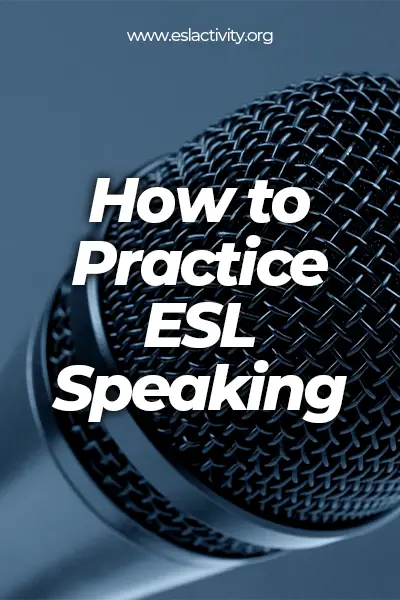If you’re looking to get some practice speaking English, you’ve come to the right place! You’re going to get five solid tips for how to improve your ESL speaking, as well as a link to even more English awesome. Are you ready to improve your English skills?
Practice Speaking English
Maybe your motivation is being able to travel the world confidently. Or perhaps you want to improve your score on the TOEIC speaking test. Maybe you want to date some foreigners in the country that you live in. Perhaps you want to immigrate to an English speaking country for work. Maybe you want to study abroad. Or you might want to be able to deliver an informative or demonstration speech in English. There are certainly a lot of reasons for wanting to practice speaking English.

Practice Speaking Fluent English
Learn How to Open a Conversation
Many ESL/EFL students are a little bit awkward when having a conversation in English. This is often because they don’t know the “unwritten” conversational rules for each culture. Things like what topics are acceptable and which are not. Or signs that someone is interested in talking to you or signs that someone is not.
There are also rules for how to open a conversation. Check out this article for a few different scenarios, such as at a business meeting, when asking for information, or if you have something in common. Finally, there’s a tip for how to open a conversation in English if all else fails. It’s guaranteed to work.
Check out the article here: Speaking English Tip #1: Learn How to Open a Conversation

How to Practice English Speaking
Learn How to Close a Conversation
Learning how to close an English conversation is just as important as knowing how to open one. I’m sure you’ve had plenty of awkward conversations at work, school, or a party when your conversation partner didn’t take the hint that you were finished talking to him. Don’t be that guy! Learn how to close the deal in style.
This article gives you tips for different situations such as at work, with close friends, on public transportation, or at a party.
Check it out here:
Speaking English Tip #2: Learn How to Close a Conversation
Related: English Speaking Tips for ESL/EFL Learners
- Bolen, Jackie (Author)
- English (Publication Language)
- 55 Pages - 01/26/2017 (Publication Date) - CreateSpace Independent Publishing Platform (Publisher)
Don’t Forget about Studying Vocabulary
If you’re interested in speaking English fluently, then you’ll need to study vocabulary. Studies show that knowing the 2000 most commonly used English words will enable you to understand 95% of what you read or hear. You’ll also be able to participate in almost any conversation about a general topic.
However, if you know fewer than 2000 words, you’ll find that you’re struggling to express what you mean easily. It’ll be hard to speak fluently when you don’t have the word you need on the tip of your tongue. This problem will be even bigger if you know less than 1000 words.
Be honest with yourself. Maybe you already know enough English vocabulary words. Just review what you already know. But, maybe you really don’t know some basic vocabulary that you should know. You’ll need to study!
Check out this article for some of our top tips for doing that. Don’t waste your time when studying English vocab, do it the efficient way!
Tip #3: Learn more Vocabulary to Speak English Fluently

Tips for ESL Speaking
Study Language Chunks to Improve your English Speaking
If more fluency is your goal, then you’ll need to consider studying language chunks. A language chunk is a group of words that are closely associated. Some examples are:
Collocations: I want to buy two CARTONS OF MILK please (see: ESL Collocations)
Phrasal verbs: Run away, break up, call back (see: phrasal verb ESL activities)
Idioms: Sick as a Dog
Sentence frames: Whales HAVE lungs, BUT fish HAVE gills.
Sentence starters: The first thing that happened was … After that, …. Finally, …
Conversational routines: A: Thank you. B: You’re welcome.
It’s best to memorize common chunks together instead of each individual word. If it can become automatic in your brain, you’ll be able to speak English more fluently. Check out our advice on how to study language chunks here:
Related: Tip-How to Close a Conversation
Use YouTube to Learn English
One of the best resources for speaking English practice is YouTube. There are a million and one free resources that are entertaining, useful, and interesting. However, it’s really, really, really easy to waste a lot of time on this site. I’m sure you’ve had that experience already. You go to YouTube to watch one little video, and then two hours have passed, and you have no idea what happened.
Here’s how not to waste your time when using YouTube to learn English.
Tip #5: Learning English on YouTube
ESL Speaking Test Questions
As a student learning English as a second language, you might want to take English exams like IELTS for various reasons. One of the reasons for taking tests like IELTS can be applying for a job or school. Whatever the reason is, you would want to have yourself prepared. Check out the go-to resources for ESL speaking tests.
- IELTS Speaking Tips: Check out the five most important things when taking English speaking tests.
Following are some of the most common ESL Speaking Test Questions:
- What is your job?
- What do you study?
- Why do you study English?
- Where is your hometown?
- Describe your favourite food, book, music, or movie.
- Describe the people you know – family, friends, neighbors.
- Introduce yourself.
Need More Tips for Speaking English Fluently?
- Bolen, Jackie (Author)
- English (Publication Language)
- 55 Pages - 01/26/2017 (Publication Date) - CreateSpace Independent Publishing Platform (Publisher)
FAQ About Practice Speaking English
Here are some of the most frequently asked questions about how to practice speaking English. Check out the answers!
How can I practice speaking English?
Check out the 10 easy steps for practicing English speaking.
Which topic is best for English speaking?
Some of the best topics for English speaking are family, friends, vacation, food, book, music, movie, work, school, and biggest fear.
How can I speak English fluently?
Try out the ESL speaking fluency activity: 120-90-60.
More Ideas for How to Practice Speaking English
Practicing speaking is essential for improving your fluency and confidence. Here are some effective ways to practice speaking English
Engage in conversation with native English speakers
Find opportunities to speak with native English speakers. This could be through language exchange programs, online language forums, or joining local conversation groups. Speaking with native speakers helps you become accustomed to natural speech patterns and improves your pronunciation.
Use language learning apps
There are various language learning apps available that offer speaking exercises and conversations with virtual characters or language tutors. These apps provide an interactive way to practice speaking English at your own pace.
Join English-speaking clubs or communities
Look for English-speaking clubs or communities in your area or online. These groups often organize language exchange events, debates, or discussions where you can practice speaking English with other learners and native speakers.
Watch and listen to English media
Regularly watch movies, TV shows, or documentaries in English. Pay attention to the actors’ pronunciation, intonation, and vocabulary usage. Additionally, listen to English podcasts, news broadcasts, and audiobooks to expose yourself to different accents and speaking styles.
Practice with language partners
Find a language partner who is also learning English and set up regular practice sessions. You can take turns discussing various topics, correcting each other’s mistakes, and providing feedback. Online platforms and language exchange websites can help you connect with language partners around the world.
Record and listen to yourself
Use your smartphone or a voice recorder to record your voice while speaking in English. Play it back and listen carefully to identify areas where you need improvement, such as pronunciation, grammar, or fluency. This self-evaluation will help you focus on specific areas for practice.
Role-play and simulate real-life situations
Imagine different scenarios like ordering food in a restaurant, making a phone call, or having a job interview. Practice these scenarios aloud, pretending to be both the English speaker and yourself. It helps build your confidence and prepares you for real-life situations.
Speak out loud while studying English materials
When you’re studying English textbooks, articles, or essays, read them out loud. This helps you become more comfortable with speaking English and improves your pronunciation.
Set goals and challenge yourself
Establish specific goals for your English speaking practice, such as speaking for a certain amount of time each day or learning a set number of new words per week. Challenge yourself to push beyond your comfort zone and track your progress along the way.
One Thing to Remember
Remember, the key to improving your English speaking skills is consistency and practice. Dedicate regular time to speaking, be patient with yourself, and don’t be afraid to make mistakes. Embrace every opportunity to communicate in English, and you’ll gradually see improvement in your spoken English abilities.
Practice Speaking English: Join the Conversation
Did you find these tips useful for your students or yourself? I hope you now have an idea of how to practice speaking English! If you need even more tips for learning how to speak English fluently, then you’ll need to check out this book over on Amazon, 71 Ways to Practice Speaking English: Tips for ESL/EFL Learners. These five tips are directly from that book.
You can get the book in both digital and print formats. The digital one is cheaper than a cup of coffee, and you can easily read it on any device with the free Kindle reading app. Smartphone, tablet, Kindle, Mac or PC will all work. Head on over to Amazon to get the book today. Better ESL speaking is in your future.
Last update on 2022-07-17 / Affiliate links / Images from Amazon Product Advertising API





